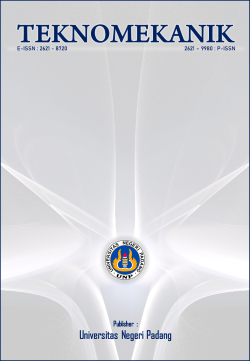Descriptive review curriculum study of vocational education in electrical engineering
DOI:
https://doi.org/10.24036/jptk.v8i2.43423Keywords:
curriculum, vocational education, electrical engineering, descriptive analysisAbstract
Educational institutions aim to produce the best professional graduates in their fields. Educational institutions cannot achieve these goals by themselves, they need the participation of the community. This situation forces education to continue to be sensitive to the needs of society, the demands of the times and government policies and to anticipate them by continuing to improve various related components in it. One of the components involved in the framework of the education system is the curriculum. This research is descriptive qualitative which aims to find out the picture, situation, a thing by describing it in as much detail as possible according to the existing facts of the Electrical Engineering Vocational Education curriculum. The results of this study indicated that the curriculum structure of the electrical engineering vocational education study program has characteristics based on the composition of the course consisting of general courses, engineering courses, and professional expertise courses. Based on the study material, engineering courses can be grouped into mandatory engineering courses, basic courses, supporting courses, and additional courses.
Downloads
References
Ade Octaviany, R., Sihotang, W., Sanjaya Simarmata, P., Rahman, A., & Muliati, A. (2022). Human Resource Development Strategy As Preparation For The Industrial Revolution Era 5.0. International Journal of Educational Research & Social Sciences, 3(3), 1157–1164. https://doi.org/10.51601/ijersc.v3i3.376
Damayanti, D. (2021). Human Resources Competency in the Era of Industrial Revolution 4.0Damayanti, D. (2021). Human Resources Competency in the Era of Industrial Revolution 4.0. Economics and Business Solutions Journal, 5(1), 13. https://doi.org/10.26623/ebsj.v5i1.3334
Dazeley, R., Goriss-Hunter, A., Meredith, G., Sellings, P., Firmin, S., Burke, J., & Panther, B. (2024). Agile Backward Design: A Framework for planning higher education curriculum. Australian Educational Researcher, 52(2), 1489–1508. https://doi.org/10.1007/s13384-024-00772-7
Fauna, A. M., Nikmatul, R., Saskia, H., Mochamad, P., & Awallillah, R. (2024). Contribution of competency-based curriculum development to improving the branding quality of. Proceedings of the 4th International Conference on Business & Social Sciences (ICOBUSS), October 2024, 26–27.
Fuadi, T. M., & Irdalisa, I. (2022). Merdeka Belajar Kampus Merdeka: Application in Education Faculty. AL-ISHLAH: Jurnal Pendidikan, 13(3), 2747–2756. https://doi.org/10.35445/alishlah.v13i3.1125
H, A. D., & Somosot, I. (2024). Implementation of Strategic Planning in Vocational High Schools to Address the Challenges of the Industrial Revolution 4 . 0. 7(2), 29–38.
Hutahaean, B., Telaumbanua, S., Tamba, L., & Hutabarat, R. G. N. (2024). Analysis of Innovative and Adaptive Higher Education Curriculum Development to Education 5.0 Based Challenges in Indonesia. International Journal of Learning, Teaching and Educational Research, 23(4), 76–98. https://doi.org/10.26803/ijlter.23.4.5
Njonge, T. (2023). Influence of Psychological Well-Being and School Factors on Delinquency , During the Covid-19 Period Among Secondary School Students in Selected Schools in Nakuru County : Kenya. VII(2454), 1175–1189. https://doi.org/10.47772/IJRISS
Nurlaela, L., Suhartini, R., Ekohariadi, Winanti, E. T., Buditjahjanto, I. G. P. A., & Munoto. (2022). Study of Vocational Education Curriculum for the Formation of Graduates Competency. Proceedings of the International Joint Conference on Arts and Humanities 2021 (IJCAH 2021), 618, 1245–1252. https://doi.org/10.2991/assehr.k.211223.216
Papanai, R., & Poolkrajang, A. (2023). The High Vocational Innovation Scholarship Program: A TVET Curriculum Continuous Quality Improvement Using Feedback from Stakeholders. Journal of Technical Education and Training, 15(4), 1–10. https://doi.org/10.30880/jtet.2023.15.04.001
Shimray, C. (2023). An analysis of the national curriculum framework for school education 2023 in the context of environmental education. Nature, 123(3110), 30–44. https://doi.org/10.1038/123861a0
Sudira, P. (2019). The Role of Vocational Education in the Era of Industrial Automation. Journal of Physics: Conference Series, 1273(1). https://doi.org/10.1088/1742-6596/1273/1/012058
Sulistyo, A. B., Soimun, A., Hidayat, D. W., Wijonarko, B., Ariesthana, P. D., & Widiangga, N. (2022). The vocational education governance at service college in the 4.0 industrial revolution era for preparing prime human resources for land transportation. International Journal of Health Sciences, 6(March), 6618–6634. https://doi.org/10.53730/ijhs.v6ns1.6416
Supriati, R., Royani Dewi, E., Triyono, Supriyanti, D., & Azizah, N. (2022). Implementation Framework for Merdeka Belajar Kampus Merdeka (MBKM) in Higher Education Academic Activities. IAIC Transactions on Sustainable Digital Innovation (ITSDI), 3(2), 150–161. https://doi.org/10.34306/itsdi.v3i2.555
Tri, N. M., Hoang, P. D., & Dung, N. T. (2021). Impact of the industrial revolution 4.0 on higher education in Vietnam: challenges and opportunities. Linguistics and Culture Review, 5(S3), 1–15. https://doi.org/10.21744/lingcure.v5ns3.1350
Veltri, N. F., Webb, H. W., Matveev, A. G., & Zapatero, E. G. (2011). Curriculum Mapping as a Tool for Continuous Improvement of IS Curriculum. Journal of Information Systems Education, 22(1), 31–42.
Yang, S. Y., & Yeh, H. Der. (2024). A simple approach using Bouwer and Rice’s method for slug test analysis. Ground Water, 42(5), 781–784. https://doi.org/10.1111/j.1745-6584.2004.tb02732.x
Yoto, Marsono, Suyetno, A., Mawangi, P. A. N., Romadin, A., & Paryono. (2024). The role of industry to unlock the potential of the Merdeka curriculum for vocational school. Cogent Education, 11(1). https://doi.org/10.1080/2331186X.2024.2335820
Downloads
Published
Issue
Section
License
Copyright (c) 2025 Arinda Frismelly, Fenti Amelia Sari

This work is licensed under a Creative Commons Attribution 4.0 International License.





